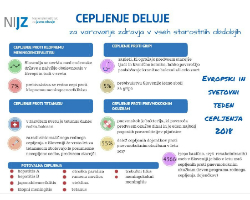European and World Immunization Week 2018 in Slovenia: vaccination is the right of the individual and responsibility of everyone

Nacionalni inštitut za javno zdravje
European and World Immunization Week was celebrated in Slovenia on 23–30 April 2018, highlighting the right of every individual to be vaccinated and the responsibility of society to ensure access to vaccination. The National Institute of Public Health (NIJZ) organized a conference, open not only for experts, but also journalists, to discuss the situation with vaccination in the country and to highlight that vaccination is one of the most effective public health measures to reduce the burden of infectious diseases. Vaccines provide individual protection, and, by interrupting the spread of a disease, also indirect protection to others who cannot be vaccinated. To achieve this group protection, called herd immunity, for a highly infectious disease like measles, at least 95% of eligible people each year need to be vaccinated. Vaccines contribute to the health and well-being of all people. In the last 60 years, vaccination has saved more children’s lives than any other medical intervention.
In collaboration with the WHO Country Office in Slovenia, the NIJZ prepared information, education and promotion materials, which have been widely distributed.
“In Slovenia, we are lucky that vaccination is available to almost every individual. Vaccine-preventable diseases are dangerous not only for children but also for adults, affecting their health, work and travel. There is no better way to reduce the risk of these diseases than by vaccination,” said Professor Maja Sočan, Head of the Department for Communicable Diseases at the NIJZ. National vaccination programmes, in particular routine childhood vaccinations, have changed the map of the occurrence of communicable diseases. “Vaccines have contributed to reducing the mortality of the most vulnerable segments of the population – infants, adolescents and elderly people,” said Darina Sedlakova, Head of the WHO Country Office in Slovenia, during the Immunization Week event. “Consistently implemented vaccination programmes have resulted in a remarkable decline in certain infectious diseases. Ensuring the safety and quality of vaccines is one of WHO’s highest priorities. Before any vaccine can be licensed, it is exhaustively evaluated and tested to make sure that it is both safe and effective. Every batch of vaccine is controlled separately before it is used, and monitoring for side effects is a continuous process that takes place at national and global levels.”
The NIJZ provided an overview of the vaccination rate against diseases included in the national routine immunization schedule. As in many other countries, coverage tends to be lower in larger cities, where attitudes towards vaccines are more mixed. After a period of declining immunization coverage, due in part to general mistrust in health authorities, a recent study published by the Ministry of Health found that the public appears to be regaining trust in the information provided by health professionals, the Ministry of Health and also WHO. The study (published in Slovenian) further explores the prevailing views and attitudes among the public in Slovenia towards vaccination, the circulating myths and key influencers that shape these attitudes.



